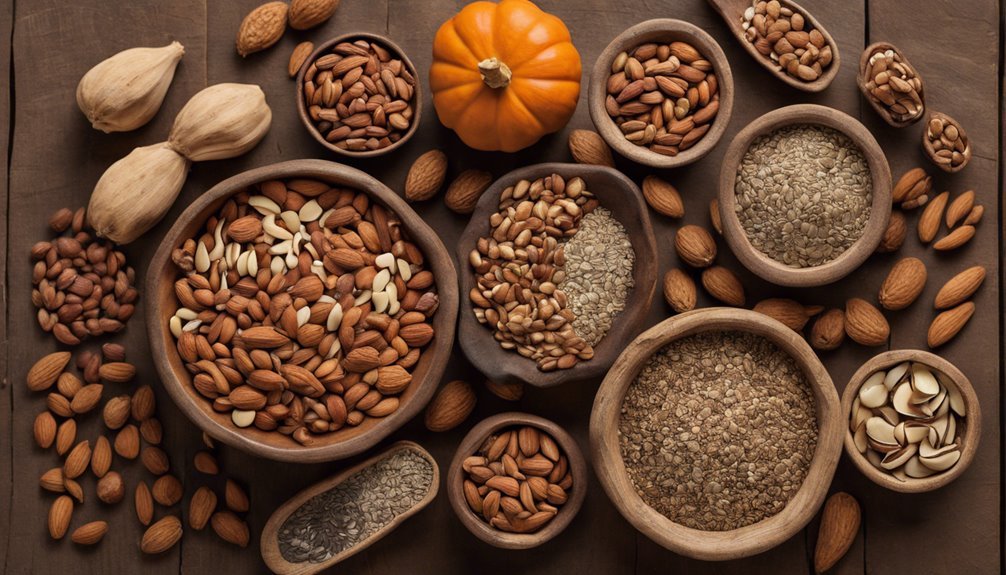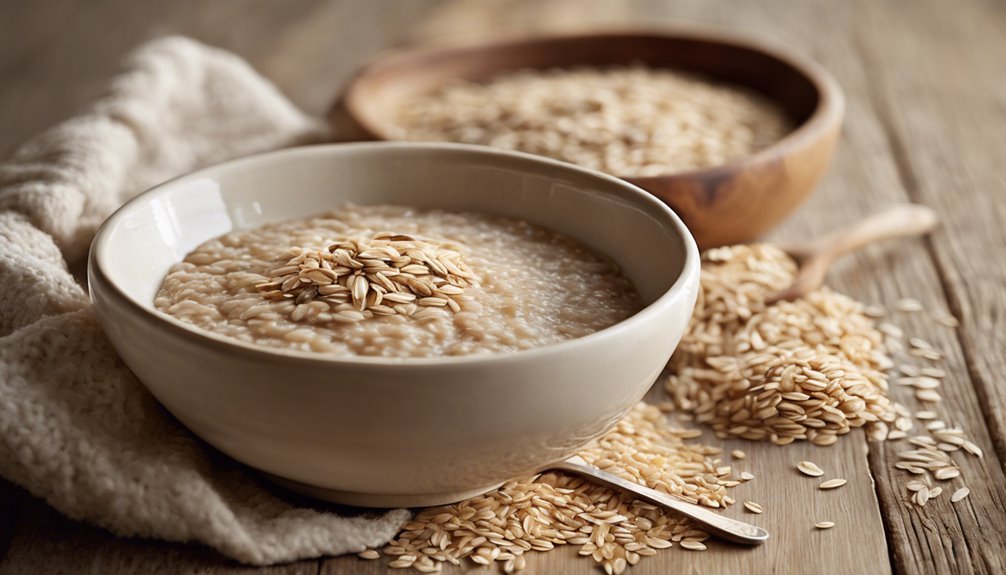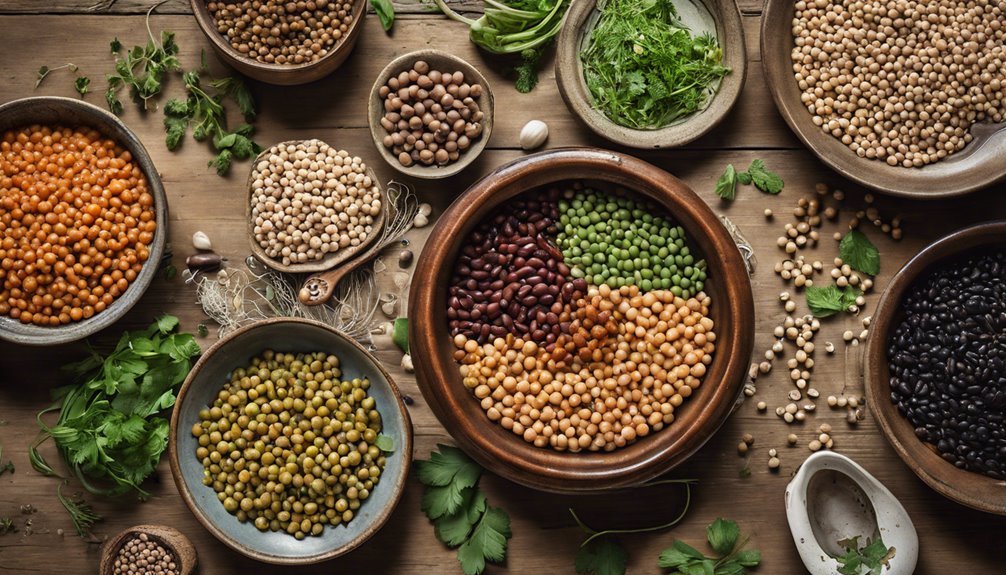"Cherishing Little Steps - A Haven for Baby and Family Journeys"
Essential Superfoods for Breastfeeding Moms
Have you ever wondered if the hype around superfoods for breastfeeding moms is justified? As you navigate this important phase, it's essential to focus on foods that not only nourish you but also enhance the quality of your breast milk. Foods like salmon, rich in omega-3 fatty acids, and spinach, loaded with iron, are not just trendy; they are pivotal for your health and your baby's development. But how can these foods specifically impact your well-being and your child's growth? Let's explore what makes these nutrients indispensable and uncover some perhaps unexpected benefits that could make a significant difference.
Key Takeaways
- Omega-3 rich fish like salmon enhance cognitive development and mood in both mother and baby.
- Chia seeds provide essential omega-3s and high dietary fiber, aiding digestion and bone health.
- Leafy greens are packed with iron, calcium, and folic acid, crucial for postpartum recovery and baby's development.
- Almonds offer vitamin E and calcium, improving breast milk quality and supporting maternal recovery.
- Quinoa is a complete protein, rich in fiber and essential minerals, supporting overall health and energy levels.
Benefits of Omega-3 Rich Fish
Including omega-3 rich fish in your diet can significantly enhance your nutritional intake during breastfeeding. Omega-3 fatty acids are crucial for your baby's neurological development and your own health.
Fish such as salmon, sardines, and mackerel are excellent omega-3 sources, providing DHA and EPA, which support cognitive and visual development in infants. These nutrients also help elevate your mood, which is vital during the postpartum period.
You might worry about mercury in fish, but by choosing the right types, you can reap the fish benefits without undue risk. Small fatty fish like sardines and wild-caught salmon are typically low in contaminants and high in essential nutrients.
Aim to incorporate these into your meals 2-3 times a week to optimize the health benefits while minimizing potential risks.
Importance of Leafy Greens
Leafy greens, such as spinach, kale, and Swiss chard, are packed with essential nutrients that are crucial for breastfeeding moms. These vegetables boast a high nutrient density, meaning they provide a wealth of vitamins and minerals in each bite, without adding excessive calories. This is particularly important when you're nurturing another life and need to maximize your nutritional intake.
Leafy greens are rich in iron, a critical component in the production of hemoglobin, which transports oxygen in your blood. This is vital for maintaining your energy levels and ensuring that your baby receives enough oxygen through your milk. They also supply a significant amount of calcium, which supports the development of your baby's bones and teeth.
Furthermore, leafy greens contain high levels of folic acid, essential for preventing birth defects and aiding in the proper development of your baby's brain and spinal cord. Including a variety of these greens in your diet not only boosts your overall health but also enhances the quality of your breast milk.
Incorporating leafy greens into your meals is simple. You can add spinach to a smoothie, toss kale into a salad, or sauté Swiss chard as a side dish. By making leafy greens a staple in your diet, you're ensuring that both you and your baby benefit from their high nutrient density.
Advantages of Nuts and Seeds

While leafy greens offer a powerhouse of vitamins and minerals, nuts and seeds are equally beneficial for breastfeeding moms. Packed with nutrient density and healthy fats, these tiny powerhouses support your body's recovery after childbirth and enhance the quality of your breast milk.
Here are three key benefits of incorporating nuts and seeds into your diet:
- Rich in Essential Nutrients: Nuts like almonds and walnuts, along with seeds such as flaxseeds and chia, are high in calcium, magnesium, and zinc. These minerals are crucial for your overall health and help in the development of your baby's bones and nervous system.
- Source of Healthy Fats: Nuts and seeds provide omega-3 fatty acids, which are vital for your baby's brain development. They also help in maintaining your energy levels, which is essential when you're caring for a newborn.
- Boosts Heart Health: The healthy fats in nuts and seeds can improve your cardiovascular health by lowering bad cholesterol levels. This is particularly important postpartum, as you need to stay healthy not just for yourself, but for your baby too.
Incorporating a variety of nuts and seeds into your diet ensures you're not only nourished but also passing on these benefits to your baby through breastfeeding.
The Power of Avocados
You may already know that avocados are more than just a staple for a delicious guacamole; they're a nutritional powerhouse essential for breastfeeding moms. Rich in healthy fats, avocados support the development of your baby's brain and nervous system. The monounsaturated fats help absorb fat-soluble vitamins like A, D, E, and K, crucial for both your and your baby's health.
Avocados are also packed with fiber, which can help you feel full longer and maintain a healthy digestive system. This is particularly important as new moms need sustained energy to care for their infants.
Furthermore, the creamy texture of avocados makes them a versatile ingredient that can be easily incorporated into various meals, ensuring you're not only nourished but also enjoying your food.
The potassium in avocados is another vital nutrient, aiding in your fluid and electrolyte balance, which is essential for maintaining healthy blood pressure levels. They also provide a good supply of folate, necessary for the prevention of birth defects and aiding in the formation of your baby's brain and spine.
Incorporating avocados into your diet provides a delicious, nutrient-rich option that supports your health and your baby's growth.
Whole Grains for Energy

After exploring the benefits of avocados, let's focus on another vital component of a breastfeeding mom's diet: whole grains. Whole grains are essential not only for their nutritional value but also as reliable energy sources, which you definitely need while nursing.
Whole grains, such as brown rice, quinoa, and oatmeal, are packed with fiber, vitamins, and minerals. Here are three key whole grain benefits that can enhance your diet and support your energy levels:
- Sustained Energy: Whole grains have complex carbohydrates that break down slowly in your body. This slow digestion process helps maintain steady blood sugar levels, providing you with a constant supply of energy throughout the day.
- Rich in Nutrients: They're high in B vitamins, including niacin, thiamine, and folate, which are vital for energy production and overall health. Iron, also abundant in whole grains, is crucial for preventing fatigue, a common concern for breastfeeding moms.
- Digestive Health: The fiber content in whole grains helps in smooth digestion and regular bowel movements, reducing the chances of constipation and keeping you more comfortable.
Incorporating whole grains into your meals can be simple and delicious. Whether it's starting your day with a bowl of oatmeal or choosing whole grain bread for your sandwiches, each choice supports your well-being as you nurture your baby.
The Role of Berries
Moving on from whole grains, let's turn our attention to berries, another superfood that plays a crucial role in the diet of breastfeeding moms. Berries aren't just delicious; they're packed with essential nutrients that can significantly benefit both you and your baby during this critical period.
Berries, including strawberries, blueberries, and raspberries, are renowned for their high vitamin C content, which supports the immune system. They're also an excellent source of fiber, helping to keep your digestive system running smoothly.
But perhaps most importantly, the antioxidant properties of berries are what set them apart. These antioxidants combat free radicals in your body, potentially reducing your stress levels and boosting overall health.
Furthermore, the berry benefits extend to mental well-being. Studies have shown that the natural compounds found in berries can enhance brain function and mood, which is crucial when you're dealing with the demands of new motherhood.
Including a variety of berries in your diet ensures you're not only nourishing your body but also aiding your emotional and psychological health.
Incorporating berries into your diet can be as simple as adding them to your morning oatmeal, blending them into smoothies, or enjoying them as a refreshing snack. Their versatility and health benefits make berries an indispensable part of your diet during breastfeeding.
Benefits of Chia Seeds

While berries offer outstanding health benefits, chia seeds also emerge as a powerful superfood for breastfeeding moms. Packed with essential nutrients, these tiny seeds can significantly boost your health and well-being during this critical period.
Let's delve into some remarkable chia seed benefits:
- Rich in Omega-3 Fatty Acids: Chia seeds are a fantastic source of omega-3 fatty acids, crucial for your baby's brain development. Regular consumption can help enhance cognitive function and support overall growth.
- High Dietary Fiber Content: You'll find that chia seeds are abundant in fiber, which is vital for maintaining good digestive health. This can help you avoid common issues like constipation, a frequent concern for nursing mothers.
- Calcium for Bone Health: They also provide a great dose of calcium, essential for bone strength. This is particularly beneficial as you need to maintain your bone health while supporting your baby's development.
Incorporating chia seeds into your diet is incredibly easy and can be quite delicious.
Explore various chia seed recipes, such as adding them to smoothies, yogurts, or baking them into your morning muffins. This not only enriches your diet but also ensures you're serving your body with the nutrients it needs during breastfeeding.
Nutritional Value of Quinoa
Quinoa, often hailed as a "super grain," is an excellent nutritional choice for breastfeeding moms seeking diverse nutrient sources. Packed with high-quality protein, it contains all nine essential amino acids, making it a rare plant-based complete protein. This is crucial for your body's repair and growth, especially postpartum.
Quinoa is also rich in fiber, which can help you feel full longer and maintain a healthy digestive system.
Moreover, quinoa benefits extend to its impressive array of vitamins and minerals. It's a good source of iron, which is vital for preventing anemia, a common concern for new moms. Additionally, quinoa provides magnesium, phosphorus, and manganese, all important for bone health, and B-vitamins, essential for energy production.
Incorporating quinoa into your diet isn't just healthy; it's also versatile. Quinoa recipes can range from simple salads to hearty soups, fitting easily into any meal plan. It cooks quickly and can be a nutritious substitute for rice or pasta.
Incorporating Legumes

After exploring the benefits of quinoa, let's consider another nutritious group important for breastfeeding moms: legumes.
These versatile ingredients are packed with protein, fiber, and essential minerals like iron and calcium, all of which are crucial for your recovery and your baby's development.
You'll find that incorporating legumes into your diet not only boosts your nutrient intake but also supports sustained energy levels, which is vital when you're caring for a newborn.
To effectively integrate legumes into your meals, consider these cooking methods and legume varieties:
- Soaking and Boiling: Beans, lentils, and chickpeas can be soaked overnight to reduce cooking time and enhance digestibility. Boil them until tender, and they're ready to be added to soups, stews, or salads.
- Sprouting: Sprouting legumes like mung beans enhances their nutritional profile by increasing vitamin content and making them easier to digest.
- Pureeing: Cooked legumes can be pureed into a smooth consistency, perfect for blending into dips or spreads, which can be a nutritious snack with whole-grain bread or vegetable sticks.
Each of these methods helps preserve the nutrients in legumes while making them a delicious part of your diet.
Experiment with different legume varieties to find your favorites and keep your meals interesting and nutritious.
Importance of Sweet Potatoes
Turning our attention to sweet potatoes, it's clear these vibrant tubers are more than just a tasty side dish; they're a powerhouse of nutrition essential for breastfeeding moms.
Sweet potatoes are celebrated for their nutrient density, which is crucial during the postpartum period. Rich in vitamins A and C, they support your immune system and skin health, both vital as your body recovers and you care for your newborn.
You'll also find that sweet potatoes are a great source of potassium, which helps maintain fluid and electrolyte balance, and magnesium, which can boost your mood and energy levels—a must when you're facing the demands of motherhood.
Their high fiber content aids digestion and can help prevent the constipation often experienced during postpartum.
Incorporating sweet potatoes into your diet isn't just smart; it's practical. They're versatile—bake, boil, or mash them—and integrate well into many dishes.
Health Benefits of Eggs

Eggs pack a nutritional punch that's especially beneficial for breastfeeding moms. They're loaded with essential nutrients that support both your health and your baby's development.
Here's why you should consider including them in your diet:
- High-Quality Protein: Eggs are a complete protein source, providing all nine essential amino acids that your body can't make on its own. Protein is crucial for the repair and growth of tissues, which is vital during the postpartum period.
- Choline for Brain Health: One egg contains about 147 milligrams of choline, which supports your baby's brain development and helps prevent developmental abnormalities. This nutrient also aids your brain function, keeping you sharp and focused.
- Versatile and Easy to Prepare: The variety of cooking methods—boiled, scrambled, poached—means eggs can easily fit into your busy schedule without sacrificing taste or nutrition.
Plus, they can be a part of numerous recipes, ensuring you never get bored.
The Magic of Almonds
Almonds are a powerhouse of nutrients, making them an excellent snack for breastfeeding moms. They're rich in vitamin E, magnesium, and essential fatty acids, all crucial for both your health and your baby's development. Regular consumption of almonds can improve the quality of breast milk due to their high calcium content, which supports skeletal development.
Almond benefits extend beyond basic nutrition. They contain antioxidants that help protect cells from oxidative stress and inflammation, common in postpartum bodies.
Plus, the fiber in almonds aids digestion and can prevent constipation, a common issue for new mothers.
Incorporating almonds into your diet isn't just healthy; it's also versatile. Try almond recipes like blending them into smoothies, chopping them into oatmeal, or making homemade almond butter.
Each serving not only delivers a nutritional boost but also helps to keep you satiated, a boon when you're busy caring for a newborn and need sustained energy.
Frequently Asked Questions
Can Superfoods Affect the Taste of Breast Milk?
Yes, the foods you eat can influence the taste of your breast milk, leading to taste variations that might align or clash with your baby's flavor preferences.
Eating a balanced, nutrient-rich diet can subtly alter the flavor of your milk.
This isn't just about your nutrition; it's about serving your baby's developing palate.
Each meal is an opportunity to gently introduce your little one to new tastes through your dietary choices.
Are There Superfoods to Avoid During Breastfeeding?
Yes, you should consider avoiding certain superfoods while breastfeeding.
Foods high in caffeine, like some superfood power blends, can affect your baby's sleep patterns.
Additionally, while not harmful, spicy foods can alter the taste of your milk and might upset your baby's stomach.
It's wise to monitor your baby's reaction and adjust your diet accordingly, prioritizing nutrients that support both your health and your baby's well-being.
How Quickly Do Superfoods Impact Milk Supply?
The impact of superfoods on your milk supply can vary based on the milk production timeline and nutrient absorption rates.
Generally, you'll notice changes within a few days to weeks. It's crucial to maintain a balanced diet rich in essential nutrients to support this process effectively.
Can I Use Superfoods to Replace Prenatal Vitamins?
You shouldn't rely solely on superfoods to replace prenatal vitamins.
While superfoods offer great benefits, enhancing your diet with a variety of nutrients, they can't provide all the essential nutrients prenatal vitamins are specifically formulated to deliver.
It's important to maintain a balanced approach to prenatal nutrition, ensuring you get the comprehensive support needed during pregnancy.
Always consult with a healthcare provider to tailor the right nutritional plan for you.
Are Any Superfoods Linked to Baby Allergies?
Imagine you've introduced kiwi, a common superfood, into your diet.
It's important to consider that some superfoods might be linked to baby allergies, especially if introduced early through breast milk.
Research is still exploring how direct this connection might be, but it's wise to monitor for any signs of allergies in your baby when consuming potent superfood sources.
Always balance nutrient-rich foods with safety to ensure you're serving both your needs and your baby's health optimally.
Conclusion
As you nurture new life, think of your body as a garden—lush and bountiful. Sowing seeds of omega-3-rich fish, leafy greens, and hearty grains helps your garden thrive. Almonds and avocados are like sunlight, energizing and healing. Legumes and sweet potatoes, the soil's richness, fortify you. Each egg, a promise of potential, nourishes deeply. With these superfoods, you cultivate health, ensuring your little sprout blossoms beautifully, supported by the best of nature's bounty.




